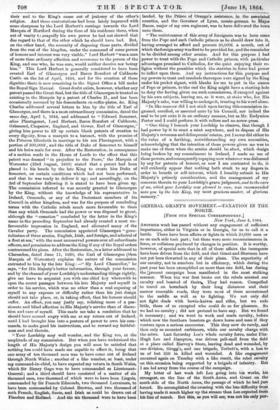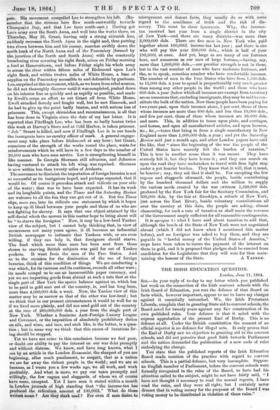GENERAL GRANT'S MOVEMENT.—TAXATION IN THE NORTH.
[Yaws OUR SPECIAL CORRESPONDENT.] New York, Tune 4, 1864. ANOTHER week has passed without any engagement of sufficient importance, either in Virginia or in Georgia, for us to call it a battle. There have been affairs or fights in which 20,000 men or so on each side took part ; but these were mere reconnaissances in force, or collisions produced by changes in position. It is worthy, however, of special note that in all of these affairs the insurgents have been driven from the field, and that Grant and Sherman have not yet been thwarted in any, of their plans. The superiority of our cavalry, not in numbers but in efficiency, which during the past year has been exemplified on more than one field, has during the :present campaign been manifested in the most striking manner. When the war first broke out the rebels scouted our cavalry and boasted of theirs% They had reason. Compelled to travel on horseback by their long distances and their narrow execrable roads, they were most of them accustomed to the saddle as well as to fighting. We not only did not fight duels with bowie-knives and rifles, but we rode little, those of us excepted who could do so for pleasure. So we had no cavalry ; did not pretend to have any. But we found it necessary ; and we went to work and made cavalry, before which now the Southern boasters go down horse and man if they venture upon a serious encounter. This they now do rarely, and then only as mounted carbineera, while our cavalry charge with the sabre. Last Saturday Lee's whole cavalry force, under Fitz- Hugh Lee and Hampton, was driven pell-mell from the field at a place called Harvey's Store, leaving dead and wounded, by one division, Gregg's, and one brigade, Torbett's, with a loss to us of but 350 in killed and wounded. A like engagement occurred again on Tuesday with a like result, the rebel cavalry on this occasion being supported by a brigade of infantry. But I am led away from the course of the campaign.
My letter of last week left Lee going into his works, his strongest, on the line of the South Anna, and Grant on the south side of the North Anna, the passage of which he had just forced. He accomplished the crossing with the less difficulty from having made it much higher up the stream than Lee expected from his line of march. But this, as you will see, was not his only par-
pose. His movement compelled Lee to strengthen his left. (Re- member that the streams here flow south-eastwardly towards Chesapeake Bay, and that Lee faces north-east.) Having got Lees army over the South Anna, and well into the works there, on Thursday, May 26, Grant, leaving only a strong skirmish line, suddenly recrosses the North Anna in the night and, thus putting two rivers between him and his enemy, marches swiftly down the north bank of the North Anna and of the Pamunkey (formed by the junction of the North and South Anna) with the constantly broadening river covering his right flank, seizes on Friday morning a ford at Hanovertown, and before Friday night his whole army is across the river within fifteen miles of Richmond upon Lee's right flank, and within twelve miles of White House, a base of supplies on the Pamunkey accessible to and defensible by gunboats. Lee, surprised at this movement, which, as we learn from rebel sources, he did not thoroughly discover until it was completed, pushed down on his interior line as quickly and as rapidly as possible, and made by Ewell's corps an effort to cut Grant off, from White House. Ewell attacked fiercely and fought well, but he met Hancock, and he had to give up the point badly beaten, and with serious loss of prisoners. This, except skirmishes and reconnaissances, is all that has been done in Virginia since the date of my last letter. It is reported that FitzHugh Lee, who has been so badly beaten twice this week at Harvey's Store and at Cold Harbor, is taken prisoner. " Jeb " Stuart is killed, and now, if FitzEtugh Lee is in our hands the insurgents have no cavalry officer of mark. A general engage- ment may take place before Richmond at any hour ; but Grant, conscious of the strength of the works round the place, waits for reinforcements which he will have in a few days to the number of 20,000 men who have seen service. 'Lee is strengthening himself in like manner. In Georgia Sherman still advances, and Johnston having ventured to attack his left wing, was repulsed. Sherman is now within less than twenty miles of Atalanta. The movement to diminish the importation of foreign luxuries is not so successful as its instigators hoped, and perhaps expected, that it would be. Of course it provokes attack and ridicule on your side of the water ; that was to have been expected. It has its weak and its laughable points, and the Times and the Saturday Review are welcome to all the fun they can get out of it. But the Times slips, more SUO, into its ridicule one statement by which it hopes to keep up ill blood between your people and those of us who are not fighting for slavery. It says that one object attained by the self-denial which the movers in this matter hope to bring about will be "to starve the foreigaer." Now, it may be a low-bred Yankee view of the subject, but I cannot help thinking that, in view of occurrences not many years agone, it ill becomes an influential British newspaper to intimate that Yankees wish, or are even willing, if they can help it, that foreigners should starve. The food which more than once has been sent from these shores to starving British subjects was paid for out of Yankee pockets. It went from the men of the Free States. And as to the occasion for the diminution of the use of foreign luxuries, think of this condition of things. We are conducting a war which, for its vastness and its costliness, exceeds all other wars ; its needs compel us to use an inconvertible paper currency, and yet we are importing goods from abroad at such a rate that at the single port of New York the specie balance against us, which has to be paid in gold sent out of the country, is, and has long been, more than 5,000,000 dols. a week. Now, the Yankee view of this matter may be as narrow as that of the other was low-bred; but we think that in our present circumstances it would be well for us if we lived more plainly, and did not send gold out of the country at the rate of 260,000,000 dols. a year from the single port of New York. Whether a feminine Anti-Foreign-Luxury League and Covenant, or the imposition of absolutely prohibitory duties on silk, and wine, and lace, and such like, is the better, is a ques- tion; but in some way we think that this excess of luxurious liv- ing should be stopped.
Yet we have not come to this conclusion because we feel poor, or doubt our ability to pay the interest on our war debt promptly and without distress. We know, and have long known, what I see by an article in the London Economist, the sharpest of you are beginning, after much puzzlement, to suspect, that as a nation we are far away the richest people in the world ; and we are so because, as I wrote you a few weeks ago, we all work, and work profitably. And what is more, we pay our taxes promptly and willingly, the few rogues and sluggards, of whom we of course have some, excepted. Yet I have seen it stated within a month in London journals of high standing that "the income-tax has produced the ridiculous amount of 100,0001." What do these writers mean ? Are they stark mad ? For even if men desire to misrepresent and distort facts, they usually do so with some regard to the semblance of truth and the risk of dis- covery. This must be sheer ignorance. Why, the income- tax received last year from a single district in the city of New York—and there are many districts—was more than 2,000,000 dols. There are five men in New York who paid together about 100,0001. income-tax last year ; and there is one who will pay this year 250,000 dols., which is half of your 100,0001. at once. And yet, large as are many of our fortunes here, and numerous as our men of large fortune,—having, say, more than 1,000,000 dols.,—our peculiar strength is not in these, but in the vast number of men who have moderate fortunes, and the, so to speak, countless number who have comfortable incomes. The number of men in the Free States who have from 1,500 dols. to 15,000 dols. a year to spend is proportionably very much greater than among any other people in the world ; and those who have 600 dols. a year (below which all incomes are exempt from taxation) are so numerous that, excluding immigrants, they may be said to con- stitute the bulk of the nation. Now these people have been paying for two years past, upon their incomes alone, 3 per cent. those of them whose incomes are more than 600 dols. and less than 10,000 dols., and five per cent, those of them whose incomes are 10,000 dols. and more. This, in addition to taxes upon plate, and carriages, and horses, and upon all manufactured articles, and upon licences, &c., &c.,—taxes that bring in from a single manufactory in New England more than 1,000,000 dols. a year ; and yet the Saturday .Review said just a month ago, and other London papers have said the like, that "since the beginning of the war the people of the United States have scarcely felt the burden of taxation." This is true in another sense than it was meant. They have scarcely felt it, but they have borne it ; and they can march on upon the road they have undertaken to travel with firm light step under a yet heavier burden. They know that it will, that it must, be heavier ; nay, they ask that it shall be. For excepting the few rogues and sluggards aforesaid, the people, beside contributing by the hundred thousand dollars and the million to supply the various needs created by the war (witness 1,250,000 dols. produced by the New York fair for the Sanitary Commission, and 300,000 dols. by the fair at Brooklyn, a suburb of New York, just across the East River), beside voluntary contributions all over the country at this date, the people are asking, almost clamouring, for such a rate of taxation as shall make the revenue of the Government amply sufficient for all reasonable contingencies.
It is apropos tl what I have said about taxation to add that, although the bonds of the State of New York were not negotiated abroad (which I did not know when I mentioned this matter before), and no foreigner was asked to buy them, and they are payable in "lawful money of the United States of America," steps have been taken to insure the payment of the interest on them in gold, and it is proposed that pledges shall be exacted from candidates for the Legislature that they will vote for thus main- taining the honour of the State. A Yssatxx.































 Previous page
Previous page